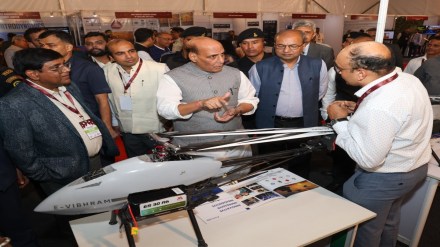Union Defence Minister Rajnath Singh has expressed a strong belief that India will achieve over Rs 50,000 crore in defence exports by the fiscal year 2029-30, highlighting the government’s commitment to fostering self-reliance in defence production through collaboration with academia. Speaking at the 65th Foundation Day celebrations at the Indian Institute of Technology (IIT) Kanpur, Singh urged Indian youth to focus on indigenously developing high-end technologies that the country currently imports, aligning with Prime Minister Narendra Modi’s vision of a “Viksit Bharat.”
In his address, Singh emphasised the critical role of technology in shaping the future, noting that nations are increasingly vying for supremacy in advanced technologies such as artificial intelligence (AI). He categorized countries into three groups based on their technological advancement: those at the forefront, those stagnant, and those like India, which are on the verge of a technological breakthrough. He expressed confidence that India is progressing rapidly toward leading in technological innovation.
Boosting defence exports
Highlighting the government’s success in boosting defence exports—from a mere Rs 600 crore a decade ago to an impressive Rs 21,000 crore in FY 2023-24—Singh reiterated his optimism for continued growth in this sector. He pointed out that the increasing reliance on technology in modern warfare—ranging from drones to hypersonic missiles—necessitates a focus on developing indigenous capabilities.
Singh acknowledged that while efforts for self-reliance have been fruitful, challenges remain, particularly in sourcing high-end technologies that are still imported. He reaffirmed the government’s dedication to collaborate with private sector players and educational institutions to overcome these obstacles. “India aims to become a developed nation by 2047, driven by the strength of our youth. We must channel all our efforts to realise that vision,” he said.
During the event, Singh introduced initiatives like the Innovations for Defence Excellence (iDEX), which allocates funds to innovators and start-ups, and the Acing Development of Innovative Technologies with iDEX (ADITI) scheme, aimed at supporting research and development in critical defence technologies. He stressed that institutions like IIT Kanpur are vital for incubating ideas and facilitating the journey from concept to product.
The celebrations also included a showcase of defence innovations from 23 start-ups incubated at IIT Kanpur, featuring advancements in autonomous systems and AI-driven surveillance technologies. Singh interacted with start-up founders, praising their efforts to enhance national security.
In conclusion, Rajnath Singh’s vision for a self-reliant India in defence, supported by a robust partnership between government, academia, and the private sector, sets a promising trajectory for the nation’s defence capabilities and export ambitions.
